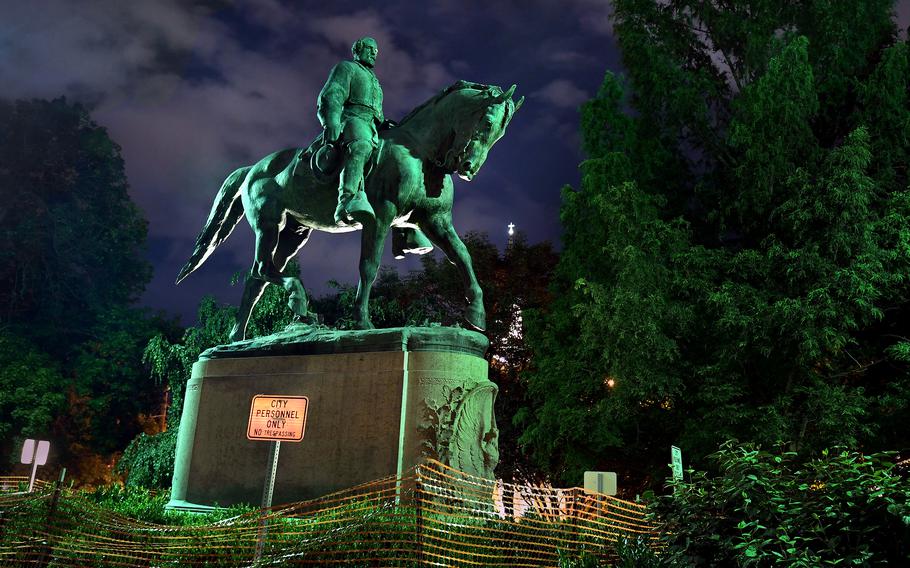
This photo from 2018 shows a statue of Confederate Gen. Robert E. Lee in Charlottesville, Va., not far from where John Henry James was lynched by a mob in 1898. The statue was removed in July. MUST CREDIT: Washington Post photo by Michael S. Williamson. (Michael S. Williamson)
It was 1898, and John Henry James was on a train headed toward certain death. The Black ice cream vendor had been falsely accused of raping a White woman, arrested and taken to a neighboring town to avoid a lynch mob. But the next morning, authorities put him on a train back to Charlottesville, where he was to be indicted at the Albermarle County Courthouse. He never made it; an angry crowd pulled him from the train outside of town and lynched him.
Within a few years, a Confederate monument nicknamed "Johnny Reb" went up at that same courthouse, along with some old Confederate cannons. Then came a statue of Stonewall Jackson next door, and two blocks away, a monument to Robert E. Lee.
The fact that James' lynching and the erection of the memorials took place in the same era and the same area is not a coincidence, according to a report from the University of Virginia published Monday in the Proceedings of the National Academy of Sciences. It found that in formerly Confederate states, counties with more Confederate memorials also had more lynchings.
This "provides compelling evidence that these symbols are associated with hate" and racism, and not more innocuous things like "heritage" or "Southern pride," the study's authors concluded.
The study was led by social psychology researcher Kyshia Henderson, along with data scientist Samuel Powers and professors Sophie Trawalter, Michele Claibourn and Jazmin Brown-Iannuzzi at U.Va.'s Batten School of Leadership and Public Policy.
As recently as 2015, 57% of Americans saw the Confederate flag as representing "Southern pride" more than racism, according to a CNN poll. Seventy-five percent of White Southerners felt it represented pride, versus only 11 percent of Black Southerners. Those numbers had hardly moved from a similar poll taken 15 years earlier in 2000.
But the debate around Confederate symbols and memorials is not just a matter of opinion; it contains "testable questions," Henderson said. "Specifically, we can test whether Confederate memorials are associated with hate."
The team compared county-level data on lynchings between 1832 and 1950 with data on Confederate memorials. They found that in any given area, and even controlling for population and other demographic variables, the number of lynchings was a "significant predictor" of the number of memorials.
The findings are correlational only; the researchers make no claims that one caused the other.
"We can't pinpoint exactly the cause and effect. But the association is clearly there," Trawalter said. "At a minimum, the data suggests that localities with attitudes and intentions that led to lynchings also had attitudes and intentions associated with the construction of Confederate memorials."
The study did not include Confederate memorials or lynchings in states that were not part of the Confederacy, like Maryland or Kentucky.
Another recent study that looked at nearly 50,000 public monuments throughout the United States found that Confederate Gen. Lee was the sixth most honored historical figure, after Abraham Lincoln, George Washington, Christopher Columbus, Martin Luther King Jr. and St. Francis of Assisi. Of 5,917 monuments in the study that mentioned the Civil War, only 1 percent also mentioned slavery.
"Where inequalities and injustices exist, monuments often perpetuate them," the authors of that report said.
Confederate flags and monuments have been largely ignored or defended by a majority of Americans for decades. Public opinion has shifted somewhat following several major events, including the 2015 racist murders at the Mother Emanuel church in Charleston, S.C., the 2017 White supremacist demonstration in Charlottesville, and the 2020 protests following the murder of George Floyd. But in 2021, a majority of Americans — though a smaller one — thought Confederate memorials should stay, according to several polls. Polling expert Ariel Edwards-Levy pointed out in HuffPost that responses depend largely on how the poll questions are worded.
The U.Va. report builds on previous studies, the authors said, that have shown the parallel rise in racist lynchings and Confederate memorials broadly rose in parallel across the country during the Jim Crow era, and found that speakers at the dedications of these memorials used white supremacist language half of the time.
In 2018, the exact site of James' lynching outside Charlottesville was identified, and soil from the spot was gathered for the national memorial to lynching victims in Montgomery, Ala.
Charlottesville's memorial to Lee came down in July. At the courthouse, the cannons, "Johnny Reb" and the statue to Jackson are also gone. In their place is a new marker, unveiled in 2019, honoring a local ice cream vendor falsely accused.